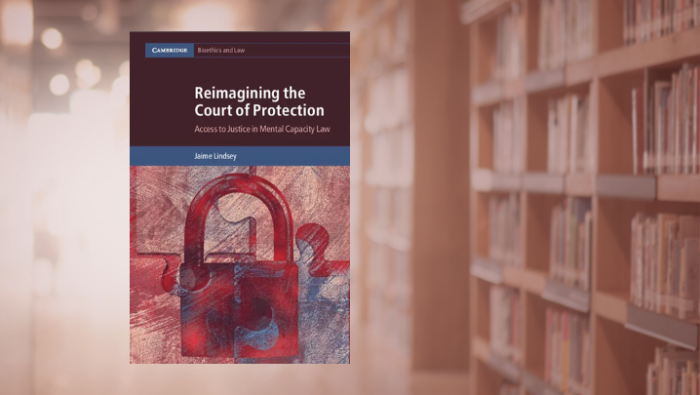
Unheard Voices in the Court of Protection: Reimagining Justice for the Vulnerable

In Reimagining the Court of Protection, Jaime Lindsey provides a critical examination of the Court of Protection (CoP) in England and Wales, highlighting its role in safeguarding vulnerable individuals and suggesting reforms to improve access to justice. Lindsey blends empirical data with socio-legal analysis, proposing a more participatory and inclusive CoP that empowers individuals to fully engage in proceedings that profoundly affect their lives (p. 1).
Lindsey’s research methodology is both rigorous and insightful, offering a deep dive into the lived experiences within the CoP. Drawing on participant observations of in-person and virtual CoP hearings, case files, questionnaires, and interviews with professionals involved in mental capacity disputes, Lindsey paints a clear picture of the challenges individuals face when navigating the CoP (p. 149-150).
Her critique is anchored by five core values—respect for the individual, participation, trustworthiness, neutrality, and flexibility (p. 35-37). These values are vividly illustrated through real-world examples, such as in University Hospital NHS Trust v. CA [2016] EWCOP 51, where the court respected an individual’s decision to refuse life-saving treatment. Other cases, such as NHS Trust v. K [2012] EWCOP 2922, where an NHS Trust sought to impose treatment against an individual’s will, and Mental Health Trust v. DD [2015] EWCOP 4, where the court intervened to prevent treatment due to concerns about capacity, further illustrate how the CoP can marginalise individuals through over-reliance on medical expertise, often at the expense of personal autonomy (p. 5).
One of Lindsey’s most compelling contributions is her focus on embodiment in legal processes—an often-overlooked dimension in traditional legal discourse. She argues that the physical presence of individuals in CoP proceedings is crucial for ensuring justice (p. 67-68). This argument is supported by her empirical findings, such as in CC v. KK and STCC [2012], where the individual’s direct participation influenced the court’s decision in her favour, underscoring the importance of personal presence in achieving fairer outcomes (p. 148).
Lindsey’s observations reveal how, when individuals are absent, their narratives are often overshadowed by medical reports and expert testimony. This creates an “epistemic injustice,” where the individual’s lived experience is sidelined (p. 5). Lindsey calls for a presumption of participation in CoP rules to address this injustice, a proposal strongly backed by her fieldwork (p. 67).
Lindsey’s data on the evolution of CoP practices, especially during the transition to virtual hearings, shows that while virtual proceedings improve accessibility, they often fall short in fostering genuine participation (p. 189). Her analysis indicates that individuals were present in only a small fraction of hearings, reinforcing the urgent need for structural reforms to ensure that justice is not compromised in either virtual or physical court settings (p. 5).
In addition to her critique, Lindsey offers innovative reforms. She advocates for integrating mediation into CoP processes, backed by both empirical data and normative analysis (p. 98-100). Mediation, she argues, provides a more flexible, person-centred approach to dispute resolution, aligning with her core values of participation and respect for the individual (p. 98). Lindsey’s survey of professionals reveals widespread support for mediation in mental capacity cases (p. 98).
Lindsey also addresses the need for structural changes to the CoP’s physical and virtual spaces (p. 189). Her call to redesign legal spaces to reflect the centrality of the individual is both visionary and practical, especially in the context of post-pandemic legal reforms (p. 191). She highlights how courtroom design can influence participation and calls for spaces that promote inclusion for those with impaired decision-making capacity.
While her primary focus is on England and Wales, Lindsey’s analysis has broader relevance (p. 2). Her arguments resonate with international frameworks, including Article 6 of the European Convention on Human Rights and Article 13 of the United Nations Convention on the Rights of Persons with Disabilities, both of which underscore the critical importance of access to justice for vulnerable individuals. The CoP’s role as a leader in mental capacity law gives Lindsey’s proposals the potential to inspire reforms in other jurisdictions grappling with similar issues (p. 2).
Lindsey’s work is not only a critique of existing practices but also a blueprint for reforming legal processes to centre the rights and experiences of individuals. Her proposals, grounded in robust empirical evidence, provide practical solutions to address the CoP’s structural deficiencies and enhance access to justice (p. 219).
Reimagining the Court of Protection is a thoughtful and actionable critique that emphasises the importance of participation and structural reform in achieving justice. Lindsey’s empirical data and practical recommendations pave a clear path towards a more inclusive CoP, making this book essential reading for anyone involved in mental capacity law and justice reforms (p. 220).

